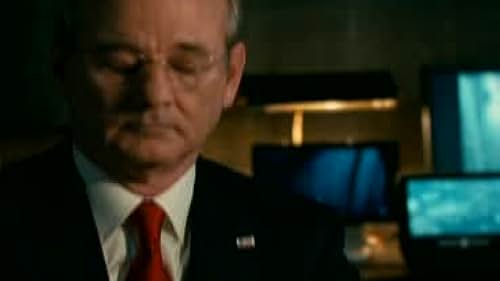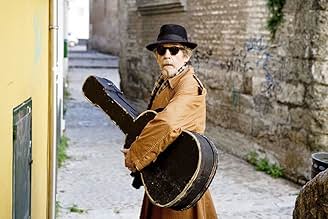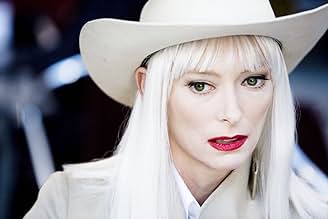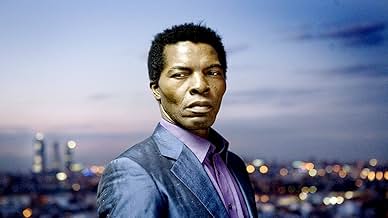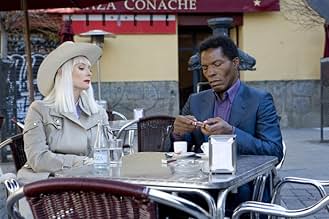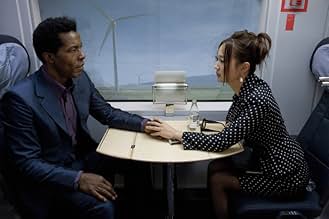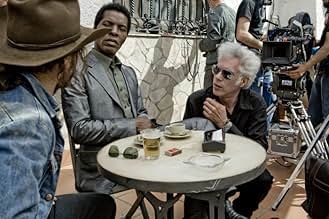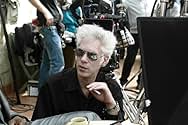The story of a mysterious loner, a stranger in the process of completing a criminal job.The story of a mysterious loner, a stranger in the process of completing a criminal job.The story of a mysterious loner, a stranger in the process of completing a criminal job.
- Awards
- 1 win total
- Waiter
- (as Oscar Jaenada)
- Second American
- (as Hector Colomé)
- Flamenco Club Waitress
- (as Maria Isasi)
- Street Kid
- (as Alexander Muñoz Biggie)
- Director
- Writer
- All cast & crew
- Production, box office & more at IMDbPro
Featured reviews
Instead, just rifle through this list of movies and if you liked any of them, you'll probably like this movie.
"Tetro" (director Francis Ford Coppola, 2009), "Broken Flowers" (director Jim Jarmusch, 2005), "Before It Had a Name" (director Giada Colagrande, 2005), "A Scene at the Sea" (director Takeshi Kitano, 1991), "Der Himmel über Berlin" a.k.a. "Wings of Desire" (director Wim Wenders, 1987), "Paris, Texas" (director Wim Wenders, 1984).
If you haven't heard of, or seen, any of those then just bear in mind that "Limits of Control", like the movies mentioned above, is very slow, almost uneventful, without a lot of revealing dialogue to carry the story. These stories are told in images, and it can be a real challenge keeping up, not because there are a lot of crazy twists and turns, but because there's almost nothing. I could sum up the plot of this movie in 8 words: "a day in the life of a hit-man". But if you're up for a challenge, give it a shot.
Film Festivals were invented in the 1930s and 1940s for local tourism & boosterism reasons (Cannes most obviously), became entrenched in the industry in the 1950s and more recently have spun out of control, numbering in the thousands and pretty much used for phony "snob appeal" in posters & trailers, using the familiar Cannes palm logo to surround the names of many idiotic and worthless events. About 25 years ago I came up with a theory that many of the "hottest" international auteurs were locked into the Fest circuit, simply because they had become the darlings of the two dozen or so most-prominent gatekeepers: the festival directors and programmers. Flash forward towards the present day and you can see how Von Trier and Tarantino spring boarded their careers (and critical acceptance, along with devoted fan bases) from key festival exposure. But for every lucky Lars or Quentin there are thousands of indie filmmakers whose movies are CONSUMED on the festival circuit -virtually their entire audience (apart from that bastard offspring, the "home viewer" addicted to Blu-Ray and DVDs) is at these phony events, with little or no subsequent theatrical exposure. Based on my recent study (using 2000 as a sample year), I estimate that roughly 90% of the indie films being made in the past decade or so have failed to find a theatrical distributor.
Back in the '80s it was a familiar group: Wenders, Greenaway, Akerman, Angelopoulos, de Oliveira, Ruiz, Tanner, Kaurismaki (and less so his brother Mika), Jarmusch, several Italians like Amelio, Tornatore and Salvatores (the second wave after Bellocchio & Bertolucci of the '60s), plus up & coming talents from exotic places like Taiwan, Iran and South Korea. What most had in common was a devotion to minimalism: the shot, the lonely landscape was pre-eminent. Film festival directors and cinema buffs are united in their devotion to such minimalist beauty, whether it be evident in the work of now-abandoned Miklos Jancso, or the best of Herzog.
With THE LIMITS OF CONTROL Jarmusch has made a film directly appealing to this film fest sensibility: it answers the pointless question: what new film would Greenaway, Akerman, Raul, Wim & Aki want to see? Such a clubby, insider approach to cinema may be rewarding if one is an amateur navel-gazer with no interest in the audience beyond a small circle of friends -perhaps (I dread) the future of "cinema/video" in a world where You Tube and MySpace are taken seriously. But to my mind this is a dead end, and a career-ending move by someone as talented as Jarmusch.
To a film buff, the obvious starting point for LIMITS OF CONTROL is Jean-Pierre Melville, whose LE SAMOURAI is the unequal-able quintessence of the loner genre. When the protagonist is lying on his bed in a lonely room, Jim fails to achieve the beauty of Melville's color drained cinematography and experimental simultaneous zoom in/dolly out surreal effects, and although Paz is a photogenic bedmate, he doesn't give poor Isaach any memorable motifs comparable to Alain Delon's wonderful pet parakeet in the apartment.
So Jim had Isaach wander around, looking cool in a series of Regis Philbin monochrome suit/shirt combos (casting Regis in the role would have elevated the film immensely for me, just as substituting Al Roker for Bill Murray in the original GROUNDHOG DAY would have made that one brilliant). In the very dull & sycophantic "making of" docu on the DVD Jim is explicit in his rant about the importance of repetition and his foolish claim that nothing is original, all stories have been done already, only variations are possible, but in the final product LIMITS OF CONTROL is way too close to Peter Greenaway's trademark approach to cinema. Copping out doesn't hide this fact. And the philosophical doggerel of his screenplay's dialog is as fatuous as Jim's telling remark in the docu that he is such an expert on music and film history, but what he DOESN'T know is what counts. Jim's apologist fans (the LAST thing he needs!) have already littered IMDb with comments on the zen-like nature of LIMITS, but its endlessly repeated guest star dialog is rather on the level of "Confucius say..." instead.
From an early supporter and fellow Ohioan, I say: it's time to pull your socks up Jim (to paraphrase my favorite Physics professor's Britishism tag line from college). One of my favorite filmmakers in the '60s when I was introduced to Underground Films every Friday & Saturday at midnight showings was George Kuchar, and he has maintained his amateurism for 40 years. I always preferred his funny, cute little story shorts to the bombastic pretentiousness of critical darlings like Michael Snow (see: WAVELENGTH) or Hollis Frampton (ZORN'S LEMMA). Jarmusch's sardonic humor bridges these two extremes of what used to be called the avant garde.
Jim, you've made the big time -you're almost in the pantheon of greats, so don't blow it by listening to the yes-men; you're better than that! Make a film Jean Renoir would be proud of -it's pointless to go down the abstract imagery road of Godfrey Reggio and Ron Fricke.
As for the soundtrack, I am a fan of some of the artists on it (Boris, Sunn, Earth, etc.), which is part of the reason I wanted to see this film initially. Because these bands can have a very slow, droney sound, I was very interested to see how the mood of the music would work with the tone of the film. I expected the two to compliment each other, but instead, the soundtrack just made everything drag on. Because the film progressed as such a slow pace, I assumed that it was leading up to a grand climax, but the film's culmination barely stood out.
I will say that I admired the film from a technical aspect, and I enjoyed seeing some familiar faces from Jarmusch's earlier work, but I don't think I'll ever watch it again.
Never has it been so thrilling, beautiful, and entertaining to watch a man walk around. The audience never knows what to expect, everything could be significant. In contrast, the mysterious man never hesitates, everything he does is carefully planned and executed, according to plan. Clearly, someone is pulling the strings. Someone, somewhere, is "in control". The camera, however, focuses on this man, one cogwheel in a large machinery. You're always aware that you only see part of the picture, that everything would make sense if you could just zoom out and know a little more.
"The Limits of Control" plays with a lot of established film clichés, and it teases you with your expectations. You are familiar with the form Hollywood movies have converged to over the past decades, how they are put together and what they have in common. Mainstream productions carefully avoid surprising their audience because after all, some of them could be disappointed or irritated. You think you know what you're up against, because you've seen it before. But "The Limits of Control" will fool you. It does not care about conventions, it tells the story it wants to.
However, this means that the film actually expects you to have been spoiled by the countless movies you've seen. It helps to know a few things about film genres and eras, but it is downright essential to have seen a number of common spy movies, action flicks, mystery thrillers. If you're not familiar with the narrative conventions used in movies, you will most likely not get the point. This made me wonder whether it is acceptable to recommend a movie if it cannot be thoroughly enjoyed without having that kind of film experience beforehand. But in the end, movies are always about one thing: whether you will have a good time watching it. And I think it must have been years since I last left a theater so delighted.
The thing is that this wouldn't be the movie you show your friend who is only just starting to develop an interest in films. For those who have been devouring movies for some time, who know a thing or two about their strengths and weaknesses, and the way they tell stories, this film is an incredible piece of art. In any case, it does however require an open mind because it might initially be hard to "keep up" with the slowness of the movie. But if you can cope with anything more sophisticated than a Michael Bay movie, you should do fine. Just don't expect to have the story and all the explanations shoved down your throat. Half of the movie takes place in your head, because you are trying to make sense of what is happening.
In more technical aspects, De Bankolé gives a breathtaking performance. At first it might not seem like he's doing much, but then you realize how perfectly every move, every look, every word, spoken or unspoken, fits the scene. The film's mystery is built on his presence, and it must have been a terrible pressure to carry so much responsibility for the atmosphere of the movie. The result is a lead character that is several times cooler than any babbling wiseacre (à la Pulp Fiction) could ever be. I was also amazed by the appearances of Tilda Swinton and John Hurt. Not only their characters, but also their lines which are symbolic for the level this movie works on.
You know how movie reviewers sometimes have to look for that perfect moment for a screen capture? A frame that is beautiful to look at and, without any motion or dialog, is able to give readers an idea of the movie's style? It must be a hell of a task for this film, because you could take such a frame from almost any of the scenes. It is in this consistently high quality, in any area, that the experience of Jarmusch as a filmmaker really shows. Every moment, every scene is carefully set up, perfectly composed and just beautiful to look at, like a picture in itself. Every word spoken is deeply meaningful, almost every sentence is a one-line word of wisdom or food for thought. Sounds are carefully used, as are the minimal musical snippets. Often, there is just a very poignant silence.
I suppose that if you are trying to decide whether you are going to watch this movie, having heard what people say about it, you wonder whether you will be disappointed in the end, whether it will just be a succession of pointless scenes. This was also my concern, but I promise that you won't feel cheated in the end. I don't care for posh movies that try to be as "artsy" as possible just for the heck of it; "The Limits of Control" is genuinely entertaining, and it is as much a part of traditional cinema as it is a reflection upon it. It is a minimal thriller, a mystery feature in the true sense of the word. You will think, you will theorize, and you will simply enjoy taking in the sights and sounds. The dream-like feel, the questions, the thoughts will accompany you for a long time after you have left the theater.
Storyline
Did you know
- TriviaThe Finnish movie, to which Man with Guitar (Sir John Hurt) refers, is The Bohemian Life (1992) by Director Aki Kaurismäki, a friend of Writer and Director Jim Jarmusch.
- GoofsWhen the Lone Man travels from Madrid to Sevilla, he enters a S 100 AVE train set. But the interior shots are clearly done in a S 103 (Velaro E), a totally different - and much newer - type of train.
- Quotes
Blonde: Are you interested in films, by any chance? I like really old films. You can really see what the world looked like, thirty, fifty, a hundred years ago. You know the clothes, the telephones, the trains, the way people smoked cigarettes, the little details of life. The best films are like dreams you're never sure you've really had. I have this image in my head of a room full of sand. And a bird flies towards me, and dips its wing into the sand. And I honestly have no idea whether this image came from a dream, or a film. Sometimes I like it in films when people just sit there, not saying anything.
- Crazy credits"NO LIMITS NO CONTROL" at the end of the closing credits
- ConnectionsFeatured in The Rotten Tomatoes Show: Watchmen/Shuttle/12 (2009)
- SoundtracksFeedbacker
Written & Performed by Boris
Courtesy of Boris
Details
- Release date
- Countries of origin
- Languages
- Also known as
- No Limits No Control
- Filming locations
- Torres Blancas - 37 Avenida de América, Madrid, Spain(apartment tower)
- Production companies
- See more company credits at IMDbPro
Box office
- Gross US & Canada
- $426,688
- Opening weekend US & Canada
- $55,820
- May 3, 2009
- Gross worldwide
- $1,981,134
- Runtime1 hour 56 minutes
- Color
- Sound mix
- Aspect ratio
- 1.85 : 1
Contribute to this page






